Matt Belinkie: So guys, I managed the tricky task of seeing Split without knowing the big twist at the end. But I DID know there was SOME kind of a twist. I was busy handicapping the likelihood of various possible twists:
- One of the abducted girls is actually a personality of McAvoy.
- ALL of the abducted girls are personalities of McAvoy.
- McAvoy is actually a personality of one of the abducted girls.
- One of the personalities of McAvoy that we see only through email is actually another person entirely, who is cleverly using someone with split personalities as the perfect fall guy for his own crimes.
- There is no split personality at all and the whole thing is a clever ruse (the Primal Fear twist).
- Etc.
But guys, there are really two twists, neither of which I saw coming, and one of which may not be a twist at all strictly speaking, even though it’s being discussed online like it’s the Mayor of Twisttown. Who’s ready for a spoilerific SplitTake?
Ben Adams: I’m ready, just let me… [takes giant sip of water]
Belinkie: Okay, so let me recap the movie quickly. Before the opening credits, three teenaged girls are kidnapped by a creepy James McAvoy. We know from the trailer/title that this guy has a split personality, but the movie actually has a pretty great Ghost Ship moment. The girls don’t realize what they’re dealing with until McAvoy walks in wearing a dress.
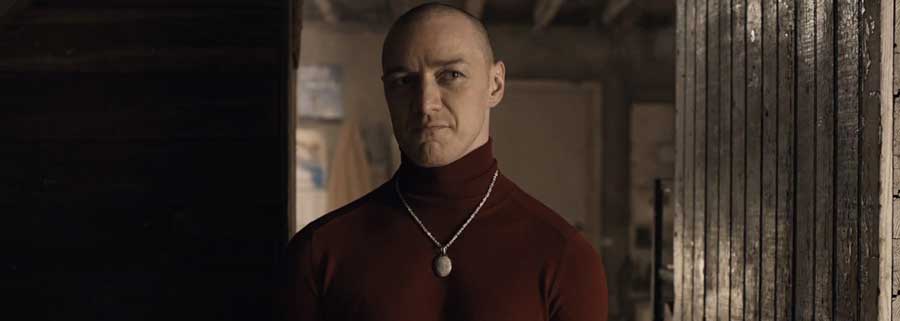
The “rules” of McAvoy’s disorder are largely communicated through his psychiatrist, who he visits several times and we see talking to other people in numerous other scenes. Basically, he has 23 personalities that are all aware of each other and can even communicate. They peacefully coexist for the most part, taking turns “sharing the light.” This is different than most split personality stories I’ve seen, in which one or more personalities are completely aware of the others. It also leads to fun scenes like when one of McAvoy’s evil personalities visits the psychiatrist pretending to be another of his personalities.
So what’s going on in Split is that two of his 23 personalities have been “banished from the light” because they believe in “The Beast,” a 24th personality that’s basically a super-powered monster. But these two evil personalities turn the tables by enlisting a third personality, a nine-year-old boy who has the mysterious ability to seize control of the light. So for 90% of the movie, we only see three personalities – the man and woman, and the kid. This came as a relief, because when I heard in the trailer that he had 23 personalities it sounded exhausting to keep track of everyone. Anyway, it becomes clear that these girls have been kidnapped to serve as some kind of sacrifice when the Beast emerges.
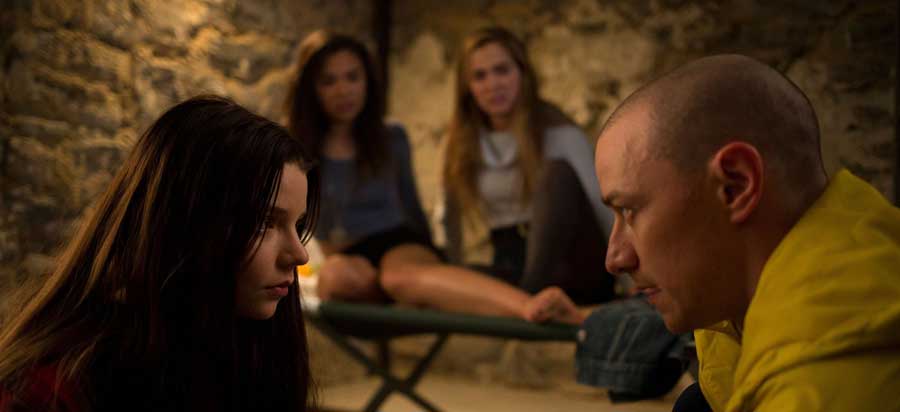
Okay, you guys want to guess at the twist ending?
Ryan Sheely: He was dead the whole time.
Belinkie: That’s a decent guess, but no. So the Beast does indeed emerge – McAvoy becomes ultra strong, his skin gets super hard, he gains the ability to climb impossible walls (somewhat unconvincingly) and his voice gets even creepier. And he does indeed completely eviscerate and eat two of the girls.
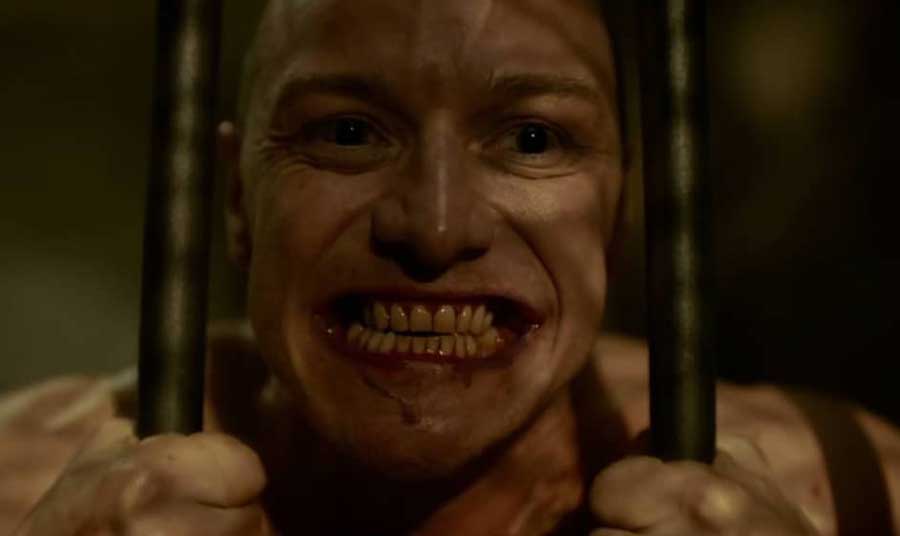
But the third girl, Casey, seems to be set up as the perfect horror movie Final Girl. Throughout the movie she gets a series of flashbacks in which her dad teaches her to hunt and lectures her about how women are smarter than men. It’s also implied she’s been horribly abused by her uncle, who she almost shot once but didn’t. Towards the end of the film she manages to briefly talk to McAvoy’s “real,” primary personality, who realizes that things have gone a tag awry and asks her to kill him. Convenient, he tells her where to find a shotgun (which we know she knows how to use) before turning back into the Beast for the final showdown.
So here we go. We’ve got the Final Girl with a shotgun being chased by James McAvoy. We’ve seen Silence of the Lambs and a dozen other horror movies; we know how this is going to go. OR DO WE?
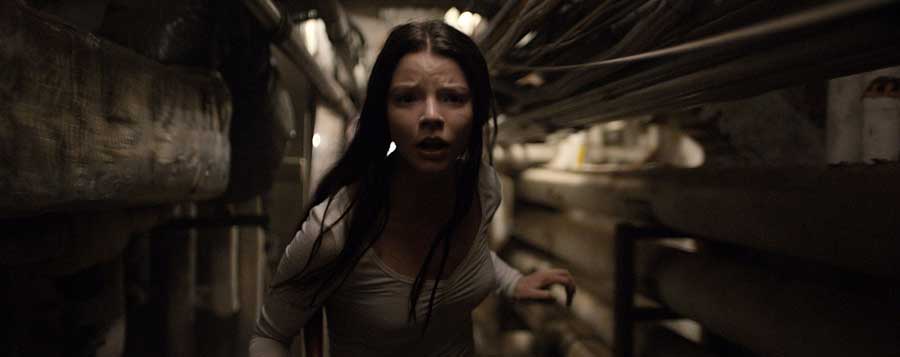
So here’s the first twist. The Final Girl completely fails to stop the bad guy. She shoots him at close range, but astoundingly he’s so strong and tough that he deflects two shotgun blasts with only minor injuries. It’s game over – she cowers in terror as he closes in. And then he sees what her torn up shirt has revealed for the first time: her arms and stomach are covered in razor scars. She’s a cutter. McAvoy instantly infers her whole backstory and backs off with a few creepy lines about how only people who have known suffering are worthy of life. Poof, he’s gone to parts unknown, and the traumatized girl gets discovered by Philly PD in the morning and returned to her abusive uncle.
So the fact that she doesn’t kill McAvoy is certainly a surprise, given all the flashbacks. But that’s not the Twist everyone is discussing. That Twist comes in the very last scene, where a bunch of people in a diner are watching a news broadcast about what would doubtlessly be the best true crime story in the history of CNN. “This reminds me of that guy in the wheelchair about fifteen years ago,” says a woman at the counter. “What was his name?” The man sitting next to her leans forward… and it’s Bruce Willis. “Mr. Glass,” he says grimly. And then he stares at the TV. Roll credits.
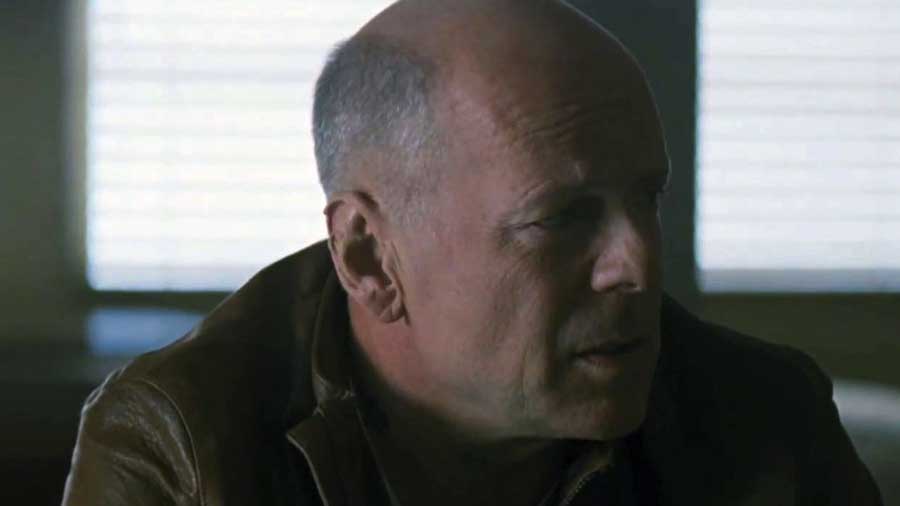
For those of you who aren’t big Shyamalan fans, Bruce Willis is appearing as his character in Unbreakable, a movie in which he had superpowers and a sweet rain poncho. The revelation that Split and Unbreakable exist in the same universe (the Shyamalanaverse) is being discussed online as a big, exciting “Twist.”
But is it a twist at all?
A twist, to me, changes your understanding of the story up until that point. Someone is secretly a man. Brad Pitt doesn’t actually exist. What you thought was true was not true. So the question is, does it MATTER that Split and Unbreakable are part of the same universe? If not, this isn’t really a twist, it’s more of an easter egg.
Adams: To answer your first question (“Is it a twist”), I think the answer is “No.” You’re right, a Twist has to be more closely tied to the plot of the story itself, instead of being tacked on to the end. I think in order to qualify as a Twist, there would have to be more connection between the films. And that ties into your second question – does it matter? I think the only way it does is if you posit this as the start of an Avengers-esque shared universe. The Nick Fury/Tony Stark cameos and post-credit sequences in the early Marvel films would be totally irrelevant (and kind of non sequitur) if they weren’t building up to something.
Belinkie: I think it’s probably not a twist but I want to consider this more carefully. Firstly, there’s at least one major point of connection between the two movies. At one point McAvoy’s psychiatrist is talking about his traumatic childhood and mentions his father “leaving on a train.” We assume that the dad just disappeared one day. But later in the movie, as part of his preparations for the coming of the Beast, McAvoy buys a bouquet of flowers and leaves them at the Amtrak train platform, and then hides inside an empty train car to transform. Now consider how Unbreakable begins: with a train crash. It’s very common for superheroes and super villains to have overlapping origin stories.
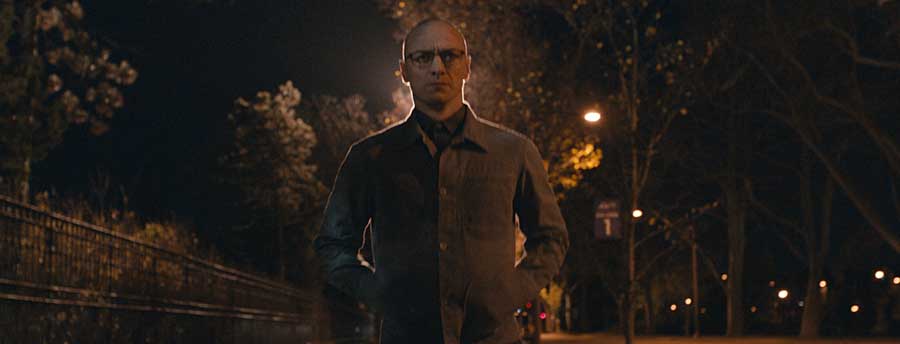
Secondly, there’s a thematic overlap. Unbreakable was basically an attempt to tell a “realistic” superhero movie, laying things out piece by piece so that everything seems plausible. In the end we have a guy with super strength and psychic ability, but along the way there’s plenty of talk by Samuel L. Jackson about how this could be totally based in science. (At least that’s how I remember it.) Split does much the same thing. We end up with a guy who can transform into a malevolent Hulk before our eyes, but only after hearing his psychiatrist lecture the University of Paris about the brain chemistry behind it all. I wonder if rewatching Unbreakable will give us more insight into McAvoy’s condition.
Finally, there’s the very strong suggestion at the end of the film that this was laying the groundwork for a crossover sequel, like you speculated, and if that’s true it might make the reveal a twist after all. We last see McAvoy in an abandoned house, conversing with himself Gollum-like about how he’s going to show the world the extraordinary things he can do. If that sequel happens, we just watched an entire movie setting up an antagonist for Bruce Willis without realizing it. We assumed that the girl was going to kill him because that’s what happens in horror movies. But the twist is that it’s not a horror movie after all. It’s a superhero movie that snuck up on us.
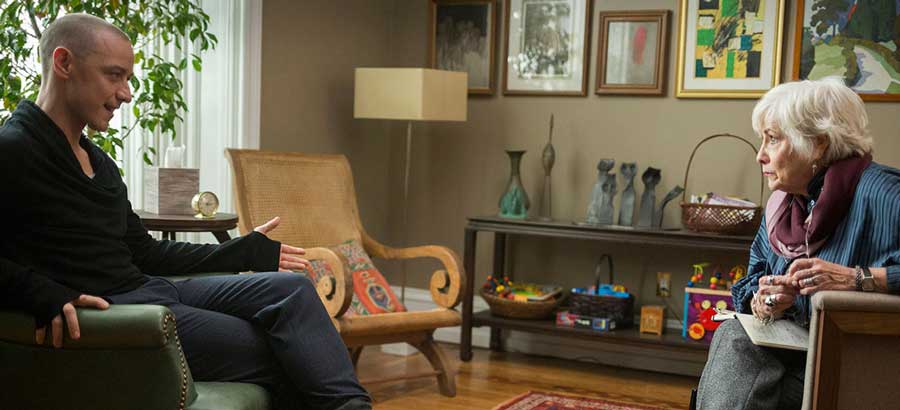
Sheely: I do think that Matt is on to something, which is that the twist works at primarily at a meta-textual level. Part of this twist is about genre- the twist is that it was a horror movie masquerading as a superhero movie all along. But another part of being a superhero movie in this day and age is being part of a cinematic universe. I find it really interesting that Shyamalan made this move, because a universe is only worth doing if people want to keep seeing these interlocking films. Given Shyamalan’s recent track record, there was no guarantee that this would be a hit. In general, my sense is that his use of twists has become a bit of a punchline. But by making the film a stealth entry into a possible universe/franchise, he was able to have his twist cake and eat it too. It was both genuinely surprising (because viewers were guessing types of twists that were more like what Matt listed earlier on), and also recontextualized the types of films Shyamalan wants to be making- more Star Wars and Marvel than old Shyamalan.
And the biggest twist of all is that it worked! Granted, this isn’t a season for heated box office competition, but winning the box office three weeks in a row wasn’t something I would have expected of the new M. Night Shyamalan movie in 2017.
Belinkie: Not so fast! I have Split feelings about this movie. I think the more important twist is when the main character completely fails to stop McAvoy or escape from him, and it’s gotten overshadowed so much by the Bruce Willis cameo that no one is really considering what the movie is trying to say.
Sheely: So what do you think that is?
Belinkie: Okay, so you’ve got three sexy teenagers kidnapped by a monster with uncertain intentions. (One of the first things McAvoy does is try to undress one of them, but then another one of his personalities intervenes and apologizes. This is not exactly a reprieve since they’re being preserved unspoiled as a human sacrifice.) But one of the teenagers is different. Flashbacks reveal that she’s been the victim of horrible abuse all her life, and also that her dearly-departed dad taught her to hunt. And then sure enough, the final act just happens to give her a shotgun.
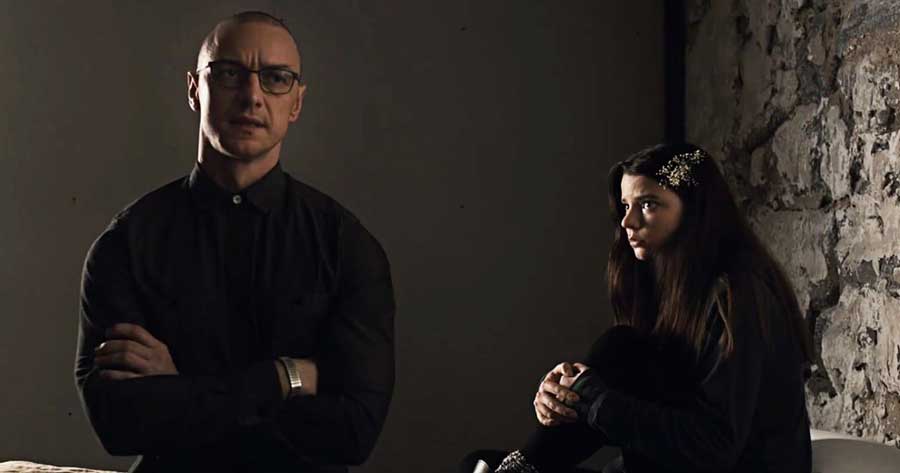
Logic would dictate that she fight back against her tormenter, which would not only be dramatically satisfying in a classic horror movie way but kind of necessary to her character arc, which is all about her feeling powerless her whole life.
But instead, her attacker is way too strong and she actually IS powerless. It’s only the fact that she was abused that saves her. She’s found the next day cowering in a cage, and the last time we see her she’s about to be reunited with her abusive uncle.
It seems like if there’s a message there, it’s a remarkably dark one. “Fighting back against monsters may be impossible no matter how strong and smart you are. Women are often at the mercy of men and there’s no escape.”
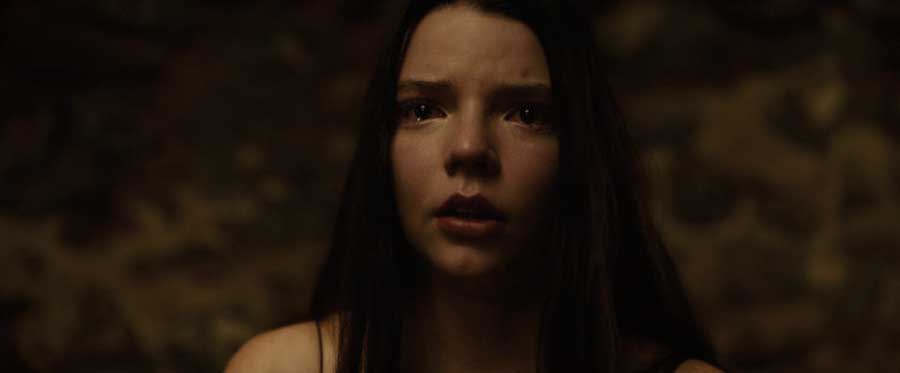
This just doesn’t jibe with the rest of the movie, which builds up a pretty strong case through the psychiatrist that sometimes abuse makes us stronger and more powerful. McAvoy views his own story that way; he was broken, and it made him mighty. That’s why he spares the girl. But there’s little evidence that her own trauma made her stronger. She probably does have the most calm under pressure of the three captives, but the other two are pretty brave and resourceful too, so it’s not like she’s the only one of them with a backbone.
So I’m weighing two possibilities here:
- I’m missing the point.
- The Unbreakable tie-in wasn’t always there. In the original ending, the girl DOES successfully fight back and defeat her captor. But when they changed it to make McAvoy unstoppable, they radically altered the girl’s story. She can’t save herself anymore; only Bruce Willis can, in the sequel.
But the reason I don’t fully buy #2 is that I can think of lots of scenarios in which the girl could have successfully fought back while still leaving McAvoy alive, thus allowing the movie to have its triumphant, feminist cake while preserving some of it for Bruce Willis (if that makes any sense). So I have to imagine that the girl’s helplessness is a choice. I’m just not sure if I like that choice.
Adams: Is there any implication that after this experience she’s now going to fight back against/kill the abusive uncle? I.e. if her trauma didn’t make her strong enough to kill an actual supervillain, did it at least effect her relationship with the merely human villain?
Belinkie: That surprises me. Wikipedia notes, “Casey’s look of determination implies she is ready to tell the police about her uncle’s abusive behavior.” But that’s just speculation – an enigmatic look isn’t a lot of resolution. It might be important that the cop she’s talking to right at the end is a young woman, who presumably would be easier to confide in than a dude. In any case, the impression I got is that Casey is out of the frying pan, into the fire. But assuming that I just missed the subtext, I like that ending better. Casey’s struggle against the Beast, although ultimately futile, at least empowers her to make some changes.
Adams: BREAKING: the Split-Unbreakable crossover sequel is coming.
Belinkie: But do we want that movie? I feel like everyone is just taking for granted that sequels and crossovers are always exciting fun. But what we like about Shyamalan’s movies is the sense of mystery and the unknown. This movie would give us two characters we already know, with well-defined rules, and have them punch each other in the face for a while.
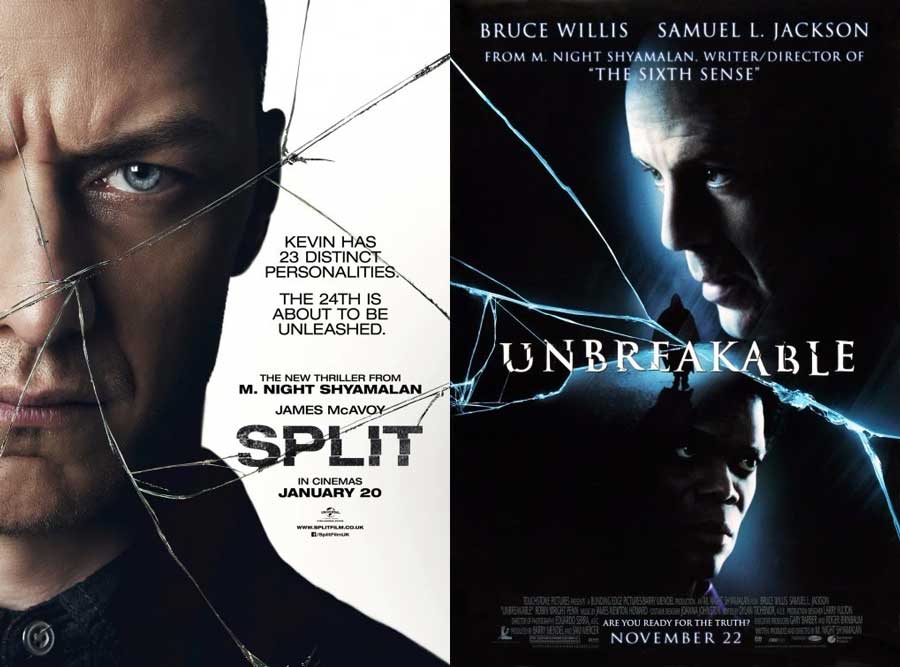
I’m not entirely convinced the cracks aren’t a coincidence, because if it were on purpose they’d be lining up EXACTLY.
He could also make a sequel to the Sixth Sense where grown-up Haley Joel Osment solves the problems of a series of ghosts. But that’s much less interesting than the gradual reveal of his horrifying secret. Even though literally everyone in America knew that the kid sees dead people (it was in the trailer!) it was still satifying to watch it unfold.
I like Unbreakable but I’ve never wished for an Unbreakable sequel where Bruce Willis fights more crime. We already got that story.
So look, after years of being a punchline (see this 2009 Overthinking It article where I gleefully root for his downfall), M. Night Shyamalan is back on top, making successful, interesting thrillers. If he says he’s got a good idea for a sequel I guess I’ll be cautiously optimistic. But I worry that this is just him milking his old characters like Ridley Scott, doing what’s easy and marketable instead of what’s original. And one thing I will say for Shyamalan is that even when he failed (Lady in the Water), he was always trying to tell a new story.
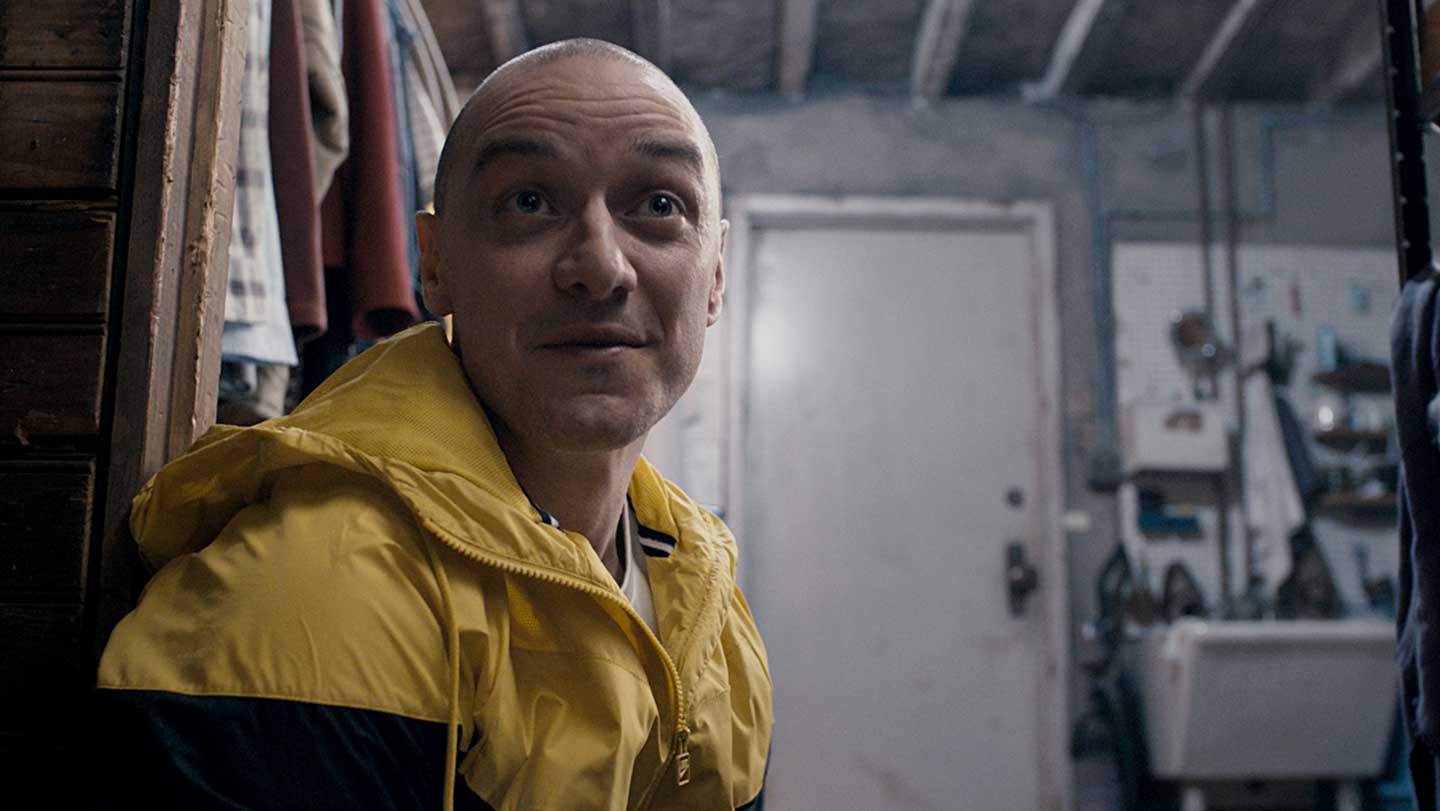
“Two of his 23 personalities have been “banished from the light” because they believe in “The Beast,” a 24th personality that’s basically a super-powered monster”.
So it’s basically how Donald Trump began his rise to power.
@Matthew_Belinkie, I think you are on to something regarding sequels. People’s dreams of the sequels for the Matrix, were way more entertaining and exciting than what actually materialized. Speculating about what the Star Wars prequels would be was way more fun than actually watching them. Trying to figure out what Stokes would say about the last episode of Cowboy Bebop (https://www.overthinkingit.com/2014/12/25/overthinking-cowboy-bebop-sessions-25-26/) for almost 4 years was more fun than what he actually said. Wait…That is a lie. Everything Stokes wrote about Cowboy Bebop was great!
But you get what I am saying. Speculating about future pop culture is almost as fun as overthinking existing pop culture.
Does can a bad ultimate product ruin the fun of speculating about what that product could have been? Does speculation have to be abandoned after the product is released? I would say that to some degree fan-fiction is speculation about a non-existent bit of pop culture, that thrives and flourishes, even though there is no way anyone is going to make a movie where Draco and Snape a gay lovers.
So the meta-textual question is, are you worried about a sequel because it is a sequel or because of Shyamalan’s track record?
The darker (and broader) point I took from Casey’s situation at the end of the film was to critique Americans’ irrational fear of a one-in-a-million, wacky, spooky guy with a mental disorder rather than the far more widespread and terrifying reality of child abuse. If Casey doesn’t show up at all in future Shyamalanverse films, her narrative absence will only underscore this critique.
My old Blockbuster coworkers and I were talking about there seem to single-idea filmgoers, just as there are frustrating single-issue voters in the electorate. There are a number of people complaining about Split because of the twist involving the Beast. Their complaints are essentially: “It was good and creepy and realistic and then it got stupid and unrealistic when the transformation occurred.” What I find so frustrating about this is that this is the same reaction to the opposite twist of The Village. There, they WANTED supernatural explanations for the evil of the forest and were disappointed by the truth. It strikes me as so limiting that people ostensibly want a narrative to be surprising, but not TOO surprising, even when the filmmaker goes to great lengths to set-up the surprise.
I found the film to be an impressive return to form for Shyamalan. As far as I know, this is the first time a film has served as a secret intermediary film to create the bridge to a sequel of a film no one was expecting. That’s pretty clever!
My hope is that Shyamalan is clever enough to make the next film more about a psychological battle of wits than a slugfest. Say, what do you think the next film will be called? Split 2? Unbreakable 2? A new 1-word title? What are the marketing implications?
@Samuel_Segrist, Thank you for offering such and insightful comment.
Regarding surprise, Do you thing that people’s reaction to surprise is tempered by their expectations based on the auteur? Like, since Shyamalan is known for twists, do people expect them and then that makes people more likely to be critical of them? Or like if you went to a Sam Raimi movie that had a Shyamalan like twist, would everybody be blown away because that isn’t what they expected? Also is the fact of a twist (that it exists) sufficient to surprise, or is there something in the execution/subversion of expectations that is required?
To the overthinkers, is the Shyamalan Twist a trope like the “Ghost Ship Moment” (patent pending)? Like are Shyamalan’s twists different than other auteurs twists? Am I calling it the Shyamalan Twist just because he does it all the time, or is it a cinematic phenomena that is more general and could have a better name? I leave to you, oh Gods of the internet.
And to your final question about the title, I think it would have to be a new one word title that referenced breaking. Possibilities: Crack, Shatter, Pieces, Shards, Chip, or Melt (if you are talking about recycling broken glass).
I just watched this, with no prior spoilers. I got the impression that she was personality 24…that the zoo was a metaphor for the psyche ward she’d been in all those years & she had finally ‘confronted’ her demons…which wasn’t the abuse by the uncle, but the guilt she felt for not shooting him when she had the chance…which left her victim (in a cage with an unarmed rifle) by choice. So she finally forgave herself when he walked away from the bars, as she realized she was the better person in that she let her uncle live…when the cop says the uncle is waiting, it’s time for her to expose to the world what he has done…her face & the bathroom scene express her still tender psyche, but her resolve to be super strong (or ‘unbreakable’) as she confronts him…
This is about Casey. I didn’t realize it until the final scene when Dunn shows up…
When little Casey is at the ready with a shot gun pointed at her uncle, the moment he snatches it away, you hear (a muffled) a gun shot. Her uncle, unharmed, then drains the remaining shells, but only a couple fall out.
Later, at her father’s funeral, Casey’s uncle tells her, “It runs in the family, you know. My dad died too. Heart attack.”
Finally, in her battle with the beast, Casey is very intentionally shown as having a total of 4 shotgun shells – to me, this implies that she did successful fire one of the shells at her uncle. At point blank range, how did her uncle not sustain any injury?
Now, Uncle is still alive, big and heavy, in a family known for heart attacks. How? An audible gunshot at point blank and no injury? How? Maybe I’m reading too much into it, but could Casey’s Uncle, and Casey, have the “Dunn gift”?
If you observe the injury on the back of Casey’s leg that the Beast gives her by viciously gnawing on it, it has a similar appearance to the Beast’s wounds – broken skin, unscathed muscle. Given the ease with which the Beast tore into her friends, isn’t it suspicious that he tears at her leg with no damage to her muscle. To boot, she doesn’t bleed out from the injury and she’s able to limp out of the zoo. Hmmmm… At the very least it seems she’s able to manifest the same ability as the Beast and will the strength to withstand physical injury. The Beast also tells her that her trauma is what makes her perfect, further implying her ability.
How great would Casey be in a role as Dunn’s sidekick in a future story?! Casey’s story is very Robin-like. Her parents have died. She has faced her fears. And, in her final scene, it’s implied that she will be either on her own, or placed in foster care (either way escaping her awful uncle). It’s very possible she would wind up with the Dunns one way or the other.
Given the story and considering classic comic book storylines, Casey has the potential to be a tragic Catwoman type villain/hero who struggles with right and wrong, vengeance and empathy, or a worthy sidekick/heir to the hero throne for Dunn.
I hope I’m not alone on this theory! Did anyone else notice these things?!
Oh! Also, with the movie posters and the cracks… do they line up if you flip one of the poster upside down and line up the opposite sides? Looks like it might……